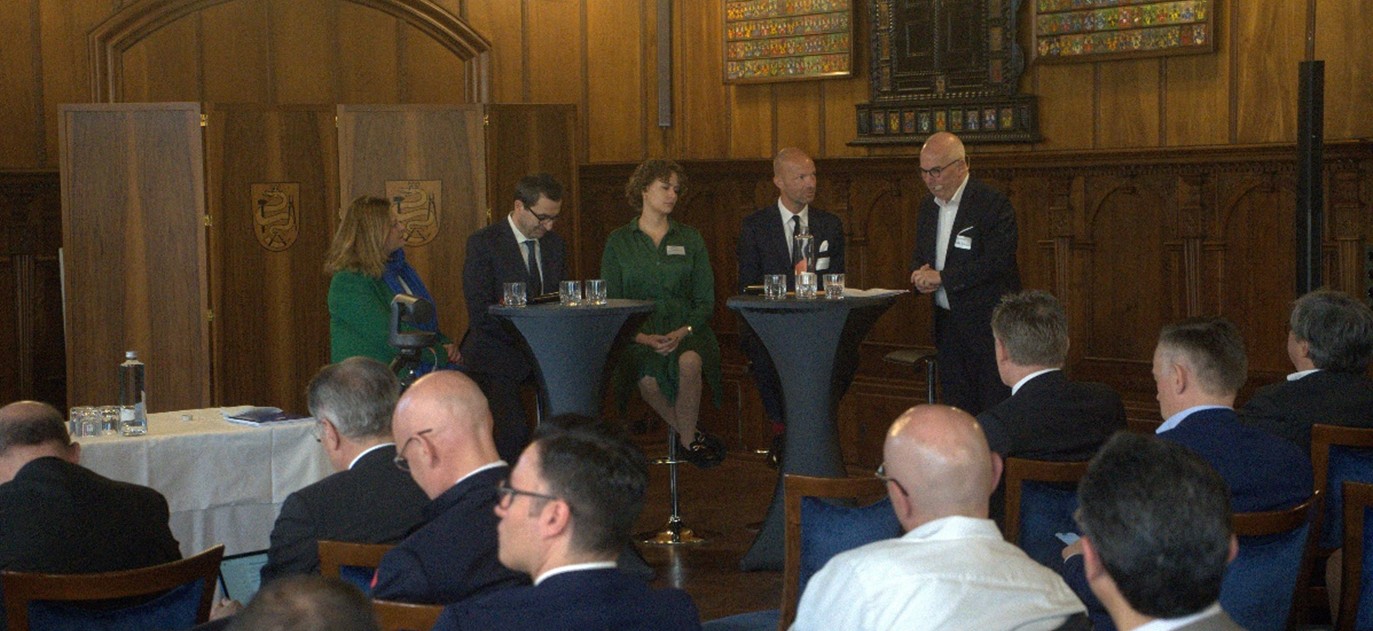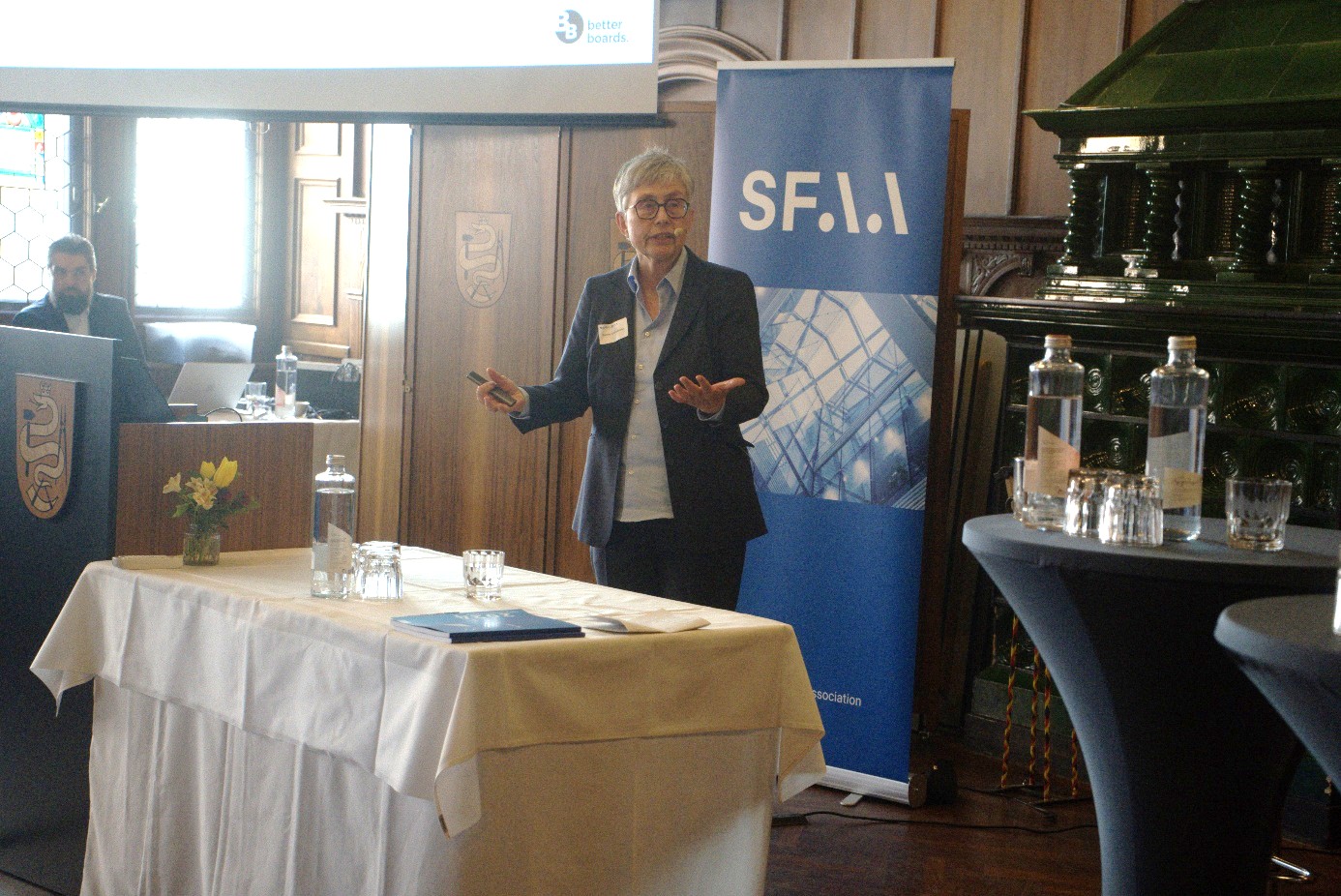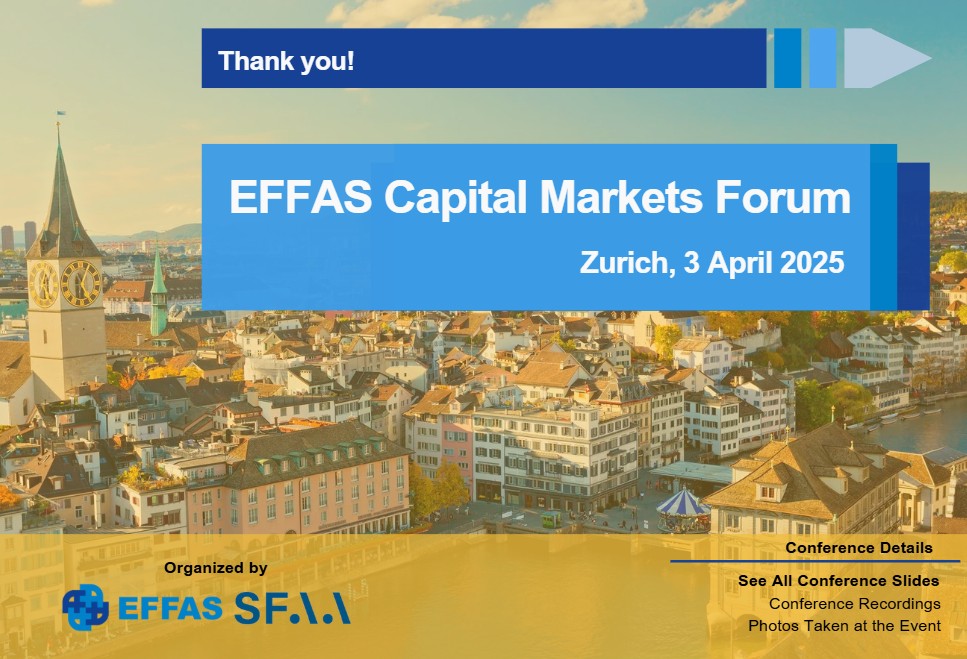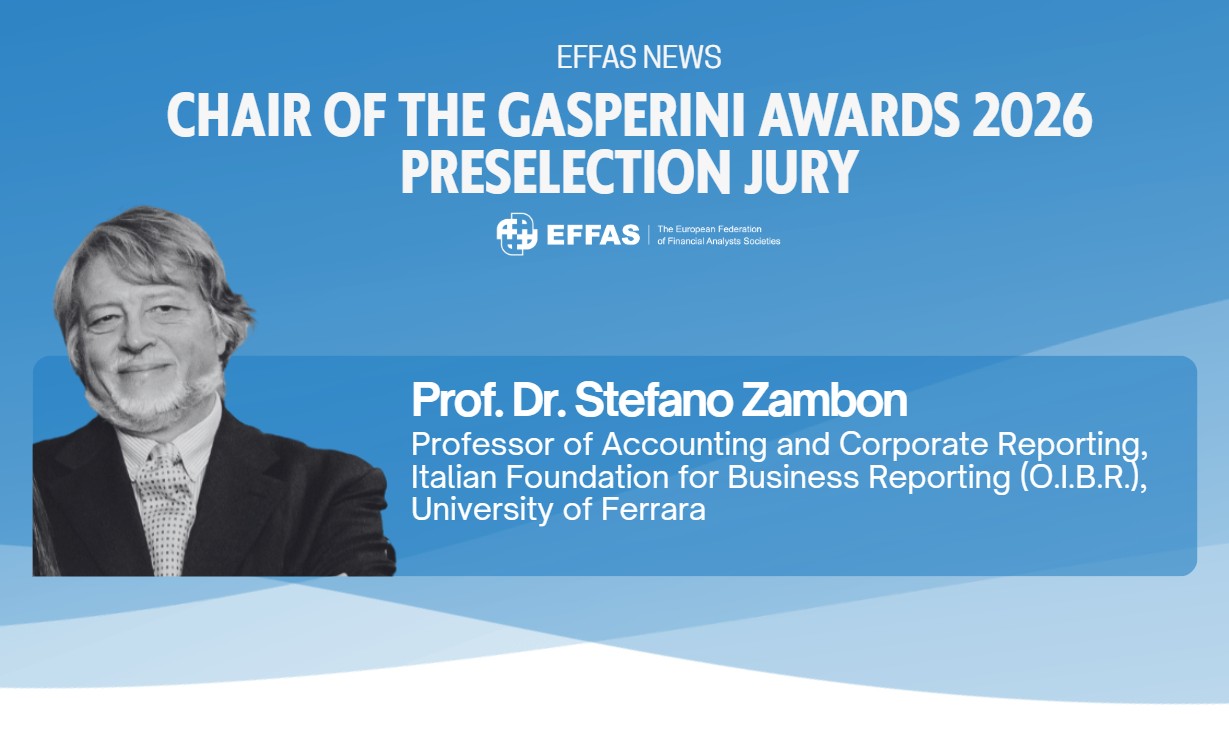Zurich, 3 April 2025
Yesterday the European Federation of Financial Analysts Societies (EFFAS) and the Swiss Financial Analysts Association (SFAA) hosted this year’s Capital Markets Forum at Zunfthaus zur Schmiden. The forum brought together top economists, researchers, and investment professionals to tackle pressing challenges shaping the future of European capital markets. The discussions provide critical guidance for industry leaders and policymakers navigating regulatory complexities and shifting investor priorities.
This year’s forum was set against the backdrop of ongoing regulatory shifts, moving investment trends and increasing scrutiny on corporate governance. Key topics on the agenda included the future of the Capital Markets Union, asset allocation in European markets, and the impact of ESG research on investment decisions.
Dr. Jesús López Zaballos, EFFAS Chair, Dr. José Antonio Blanco, SFAA Chair as well as Thorsten Müller, EFFAS Board Member and DVFA Chair welcomed the international audience. Dr. Detlef Fechtner, Chief European correspondent at Börsen-Zeitung moderated the forum.
The keynote came from Dr. Romain Baeriswyl, Deputy Head of Monetary Policy Analysis at Swiss National Bank:” Issuing a retail digital central bank currency in the current banking system is like trying to square the circle, because it challenges the role of banks as money depositaries on which the banking system is based.” Dr. Baeriswyl’s thought-provoking comments provided valuable insights into the complexities of money, capital markets, and the digital age from a Swiss perspective.
Marc Brütsch, Chief Economist at Swiss Life, analysed the economic outlook for Europe questioning” is the EU-27 an attractive investment location for global investments?’’. Given the sluggish growth in Germany Marc Brütsch is convinced that the German bazooka is the right thing to do, but we need to watch how this huge fiscal stimulus will be executed. Dr. Bütsch observed an increased savings rate in Europe due to ongoing geopolitical uncertainties.
Dr. Anja Hochberg, Head of Multi-Asset at Swisscanto covered the topic Are Global Investors Growing Cautious About European Markets? She said that due to increasing uncertainty about political decisions in the US she expected a strategic shift of investment flows from the US to Europe, and that this process had just started.

A panel discussion brought together leading experts to debate Europe’s position in global asset allocation. The panel featured Prof. Dr. Leef Dierks, Professor of International Capital Markets at Lübeck University for Applied Sciences, Jamie Vrijhof-Droese, CEO and Board Member at WHVP Ltd., Dr. Anastassios Frangulidis, Head of Multi-Asset at Pictet, and Dr. Detlef Fechtner from Börsen-Zeitung.
During the discussion, Prof. Dr. Leef Dierks played the devil’s advocate highlighting the concerns about interpreting recent market trends, stating, “A tactical short covering is not an indication of investors suddenly becoming bullish on Europe. Instead, it might simply reflect the convergence of overvalued U.S. assets and undervalued European assets. However, in light of recent events, the European business model of neo-mercantilism appears flawed. There is a real risk that Europe could become a museum of past economic prosperity. A strategic reallocation toward overweighting European assets may therefore be premature.”
The forum continued with a critical discussion on the latest developments in regulatory measures, introduced by Dr. Detlef Fechtner from Börsen-Zeitung. His keynote set the stage for an in-depth panel debate on the evolving regulatory landscape and its implications for European capital markets.
The panel, featuring Dr. Apostolos Thomadakis of the Equity Capital Market Institute, a thinktank from Brussels, Thorsten Müller, Florian Esterer (member of the IASB at IFRS), and Hans Buysse (EFFAS Board Member and representative of EFRAG) examined the challenges of market integration and regulatory coherence. Dr. Thomadakis emphasized the need for structural reforms, stating, “Europe’s Capital Markets Union remains a vision on paper—until we tackle fragmentation, unlock cross-border investments, and simplify our regulatory framework, we will continue asking: is it still alive?” Meanwhile, Florian Esterer highlighted growing tensions between investors and policymakers, remarking, “Global investors need comparable corporate disclosures. This puts them increasingly at odds with politicians in their jurisdictions.”
The forum then turned to the growing role of ESG factors in sell-side research, with Rocchino Contangelo, Head of Buy-Side Research at Swisscanto, delivering a keynote on how sustainability metrics are reshaping investment analysis. He emphasized a shift in focus, stating, “Top-notch investment research now focuses on spotting resilience in non-financial data, not just forecasting earnings.”

This was followed by a panel discussion featuring Josep Pujal (Keple Cheuvreaux), Menka Bajaj (Bank of America), Volker Sack (Head of DVFA corporate analysis commission), Gian Marco Werro (Swisscato), and Rocchino Contangelo, debated the necessary depth of ESG data in capital markets research. Addressing the balance between data volume and usability, Josep Pujal remarked, “Quality is more important than quantity. We need to focus on a small number of KPIs, but they must be reliable and standardized.” Volker Sack stated that ESG KPIs will be highly individual depending on the business model of the respective company. “In terms of the number of ESG data points, we would welcome a reduction and a focus on the 5-10 ESG KPIs that should be part of the corporate strategy. Our advice: As little as possible, but as much as is necessary.”
The discussion highlighted the challenges of integrating ESG metrics effectively, emphasizing the need for standardized, high-quality data to ensure meaningful insights for investors while avoiding information overload.
Dr. Sabine Dembkowski, Founder and Managing Partner at Better Boards Ltd presented the importance of board evaluations in Europe. She highlighted growing investor expectations for board accountability, stating, “Many leading global asset management companies expect annual internal board evaluations and encourage periodic external evaluations”. She diagnosed an extremely high-cost effectiveness of digital platforms to evaluate boards versus a classic consulting-based approach.

About EFFAS
EFFAS is a Not-for-profit organisation set up in 1962 with 14 national member associations in Europe, representing more than 18,000 Financial analysts, Asset managers, pension fund managers, corporate finance specialists, risk managers, treasurers among many other professional profiles from the investment profession. EFFAS is a certification body for finance with over 27,000 certificate holders worldwide.
For further information, please contact:
Raquel Zaragoza Marti | Managing Director E-mail: raquel.zaragoza@effas.com
Phone Number: +49 69 98959519







